Nursing Assignment: HIPAA and Personal Information Protection
VerifiedAdded on 2023/01/16
|8
|1970
|37
AI Summary
This nursing assignment discusses the requirements and responsibilities charged to Midwest OB-Gyne Affiliates by the HIPAA in reference to the protection of personal information.
Contribute Materials
Your contribution can guide someone’s learning journey. Share your
documents today.

Running Head: 948709 1
Nursing Assignment
Name
Institution
Course
Instructor
Date of Submission
Nursing Assignment
Name
Institution
Course
Instructor
Date of Submission
Secure Best Marks with AI Grader
Need help grading? Try our AI Grader for instant feedback on your assignments.
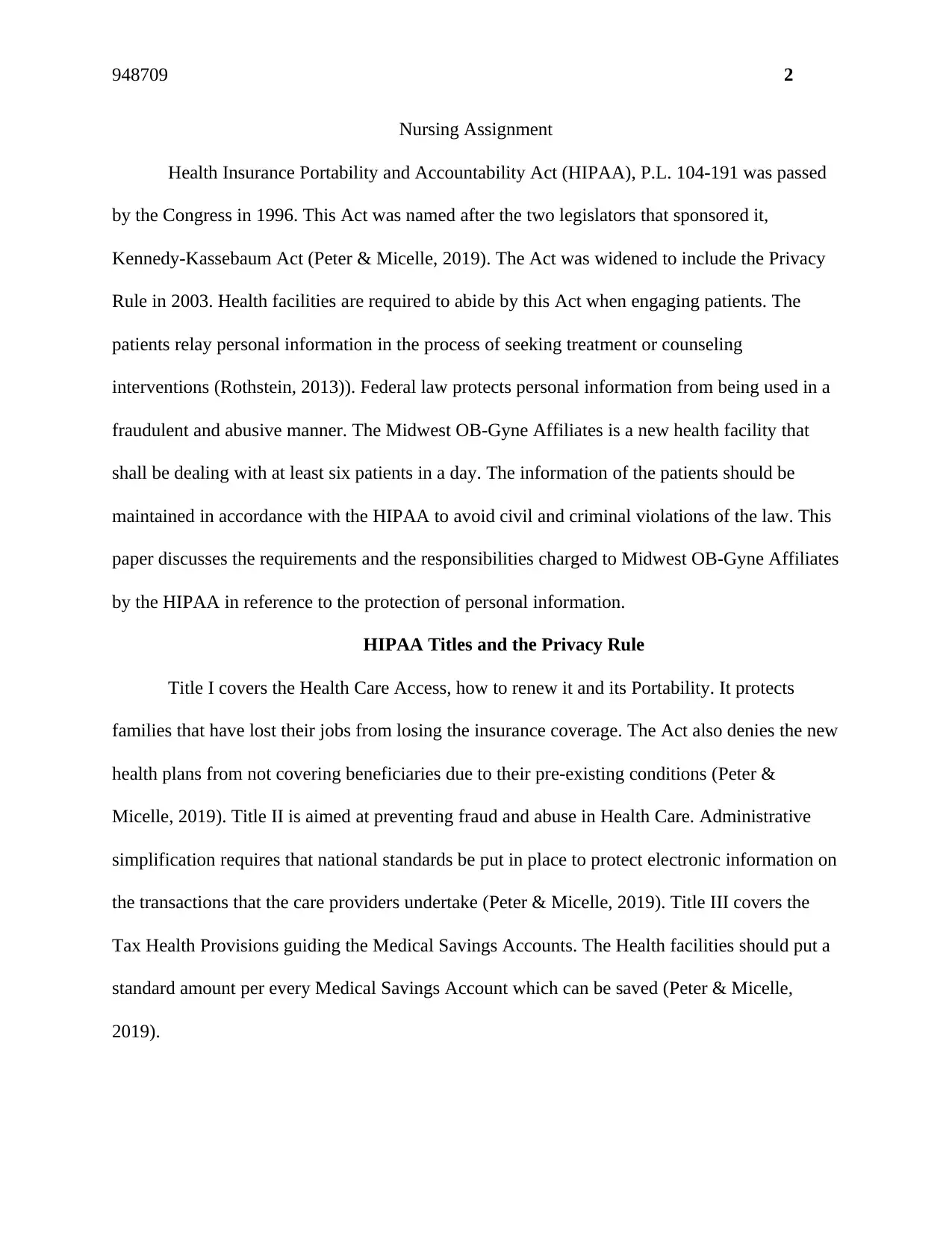
948709 2
Nursing Assignment
Health Insurance Portability and Accountability Act (HIPAA), P.L. 104-191 was passed
by the Congress in 1996. This Act was named after the two legislators that sponsored it,
Kennedy-Kassebaum Act (Peter & Micelle, 2019). The Act was widened to include the Privacy
Rule in 2003. Health facilities are required to abide by this Act when engaging patients. The
patients relay personal information in the process of seeking treatment or counseling
interventions (Rothstein, 2013)). Federal law protects personal information from being used in a
fraudulent and abusive manner. The Midwest OB-Gyne Affiliates is a new health facility that
shall be dealing with at least six patients in a day. The information of the patients should be
maintained in accordance with the HIPAA to avoid civil and criminal violations of the law. This
paper discusses the requirements and the responsibilities charged to Midwest OB-Gyne Affiliates
by the HIPAA in reference to the protection of personal information.
HIPAA Titles and the Privacy Rule
Title I covers the Health Care Access, how to renew it and its Portability. It protects
families that have lost their jobs from losing the insurance coverage. The Act also denies the new
health plans from not covering beneficiaries due to their pre-existing conditions (Peter &
Micelle, 2019). Title II is aimed at preventing fraud and abuse in Health Care. Administrative
simplification requires that national standards be put in place to protect electronic information on
the transactions that the care providers undertake (Peter & Micelle, 2019). Title III covers the
Tax Health Provisions guiding the Medical Savings Accounts. The Health facilities should put a
standard amount per every Medical Savings Account which can be saved (Peter & Micelle,
2019).
Nursing Assignment
Health Insurance Portability and Accountability Act (HIPAA), P.L. 104-191 was passed
by the Congress in 1996. This Act was named after the two legislators that sponsored it,
Kennedy-Kassebaum Act (Peter & Micelle, 2019). The Act was widened to include the Privacy
Rule in 2003. Health facilities are required to abide by this Act when engaging patients. The
patients relay personal information in the process of seeking treatment or counseling
interventions (Rothstein, 2013)). Federal law protects personal information from being used in a
fraudulent and abusive manner. The Midwest OB-Gyne Affiliates is a new health facility that
shall be dealing with at least six patients in a day. The information of the patients should be
maintained in accordance with the HIPAA to avoid civil and criminal violations of the law. This
paper discusses the requirements and the responsibilities charged to Midwest OB-Gyne Affiliates
by the HIPAA in reference to the protection of personal information.
HIPAA Titles and the Privacy Rule
Title I covers the Health Care Access, how to renew it and its Portability. It protects
families that have lost their jobs from losing the insurance coverage. The Act also denies the new
health plans from not covering beneficiaries due to their pre-existing conditions (Peter &
Micelle, 2019). Title II is aimed at preventing fraud and abuse in Health Care. Administrative
simplification requires that national standards be put in place to protect electronic information on
the transactions that the care providers undertake (Peter & Micelle, 2019). Title III covers the
Tax Health Provisions guiding the Medical Savings Accounts. The Health facilities should put a
standard amount per every Medical Savings Account which can be saved (Peter & Micelle,
2019).
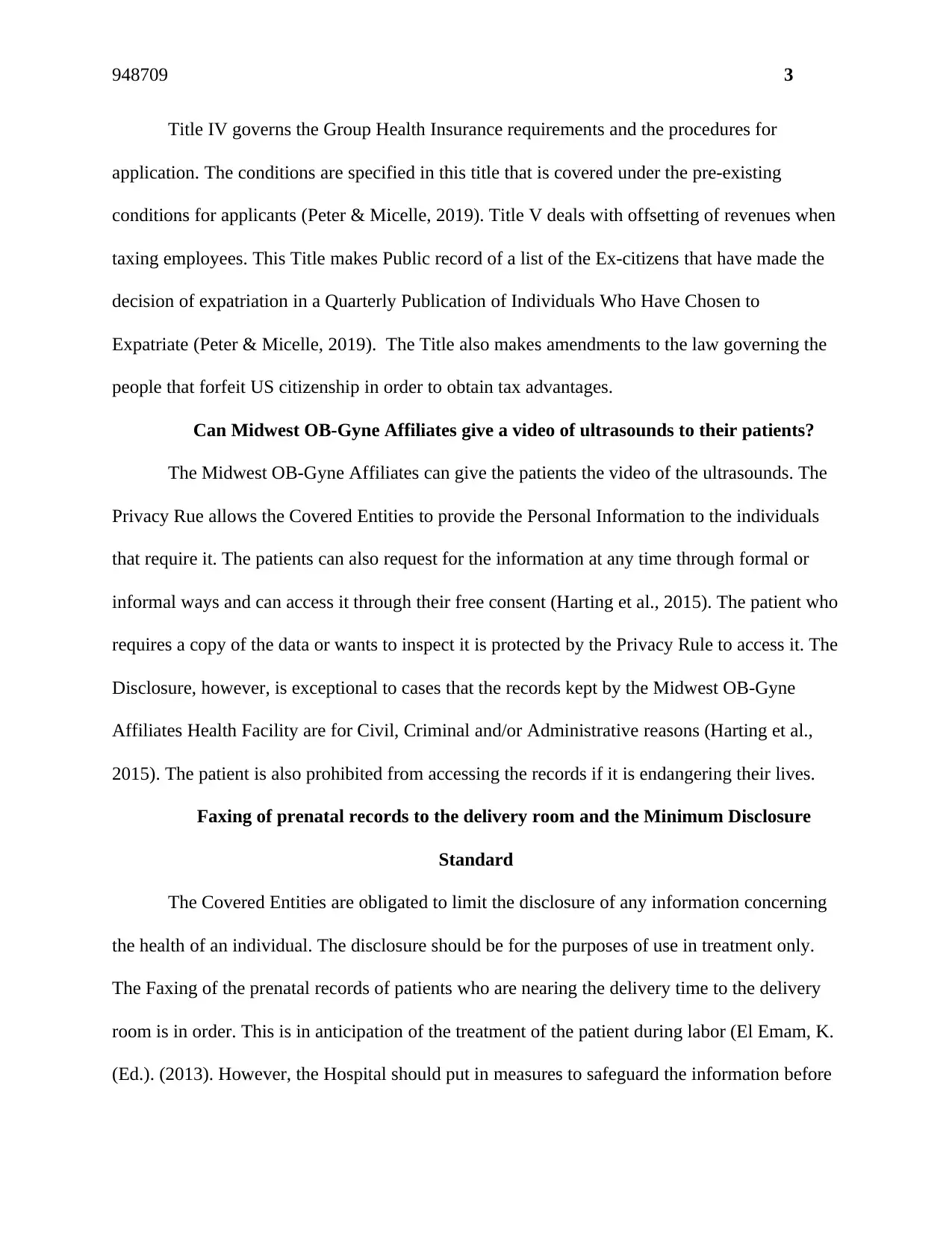
948709 3
Title IV governs the Group Health Insurance requirements and the procedures for
application. The conditions are specified in this title that is covered under the pre-existing
conditions for applicants (Peter & Micelle, 2019). Title V deals with offsetting of revenues when
taxing employees. This Title makes Public record of a list of the Ex-citizens that have made the
decision of expatriation in a Quarterly Publication of Individuals Who Have Chosen to
Expatriate (Peter & Micelle, 2019). The Title also makes amendments to the law governing the
people that forfeit US citizenship in order to obtain tax advantages.
Can Midwest OB-Gyne Affiliates give a video of ultrasounds to their patients?
The Midwest OB-Gyne Affiliates can give the patients the video of the ultrasounds. The
Privacy Rue allows the Covered Entities to provide the Personal Information to the individuals
that require it. The patients can also request for the information at any time through formal or
informal ways and can access it through their free consent (Harting et al., 2015). The patient who
requires a copy of the data or wants to inspect it is protected by the Privacy Rule to access it. The
Disclosure, however, is exceptional to cases that the records kept by the Midwest OB-Gyne
Affiliates Health Facility are for Civil, Criminal and/or Administrative reasons (Harting et al.,
2015). The patient is also prohibited from accessing the records if it is endangering their lives.
Faxing of prenatal records to the delivery room and the Minimum Disclosure
Standard
The Covered Entities are obligated to limit the disclosure of any information concerning
the health of an individual. The disclosure should be for the purposes of use in treatment only.
The Faxing of the prenatal records of patients who are nearing the delivery time to the delivery
room is in order. This is in anticipation of the treatment of the patient during labor (El Emam, K.
(Ed.). (2013). However, the Hospital should put in measures to safeguard the information before
Title IV governs the Group Health Insurance requirements and the procedures for
application. The conditions are specified in this title that is covered under the pre-existing
conditions for applicants (Peter & Micelle, 2019). Title V deals with offsetting of revenues when
taxing employees. This Title makes Public record of a list of the Ex-citizens that have made the
decision of expatriation in a Quarterly Publication of Individuals Who Have Chosen to
Expatriate (Peter & Micelle, 2019). The Title also makes amendments to the law governing the
people that forfeit US citizenship in order to obtain tax advantages.
Can Midwest OB-Gyne Affiliates give a video of ultrasounds to their patients?
The Midwest OB-Gyne Affiliates can give the patients the video of the ultrasounds. The
Privacy Rue allows the Covered Entities to provide the Personal Information to the individuals
that require it. The patients can also request for the information at any time through formal or
informal ways and can access it through their free consent (Harting et al., 2015). The patient who
requires a copy of the data or wants to inspect it is protected by the Privacy Rule to access it. The
Disclosure, however, is exceptional to cases that the records kept by the Midwest OB-Gyne
Affiliates Health Facility are for Civil, Criminal and/or Administrative reasons (Harting et al.,
2015). The patient is also prohibited from accessing the records if it is endangering their lives.
Faxing of prenatal records to the delivery room and the Minimum Disclosure
Standard
The Covered Entities are obligated to limit the disclosure of any information concerning
the health of an individual. The disclosure should be for the purposes of use in treatment only.
The Faxing of the prenatal records of patients who are nearing the delivery time to the delivery
room is in order. This is in anticipation of the treatment of the patient during labor (El Emam, K.
(Ed.). (2013). However, the Hospital should put in measures to safeguard the information before
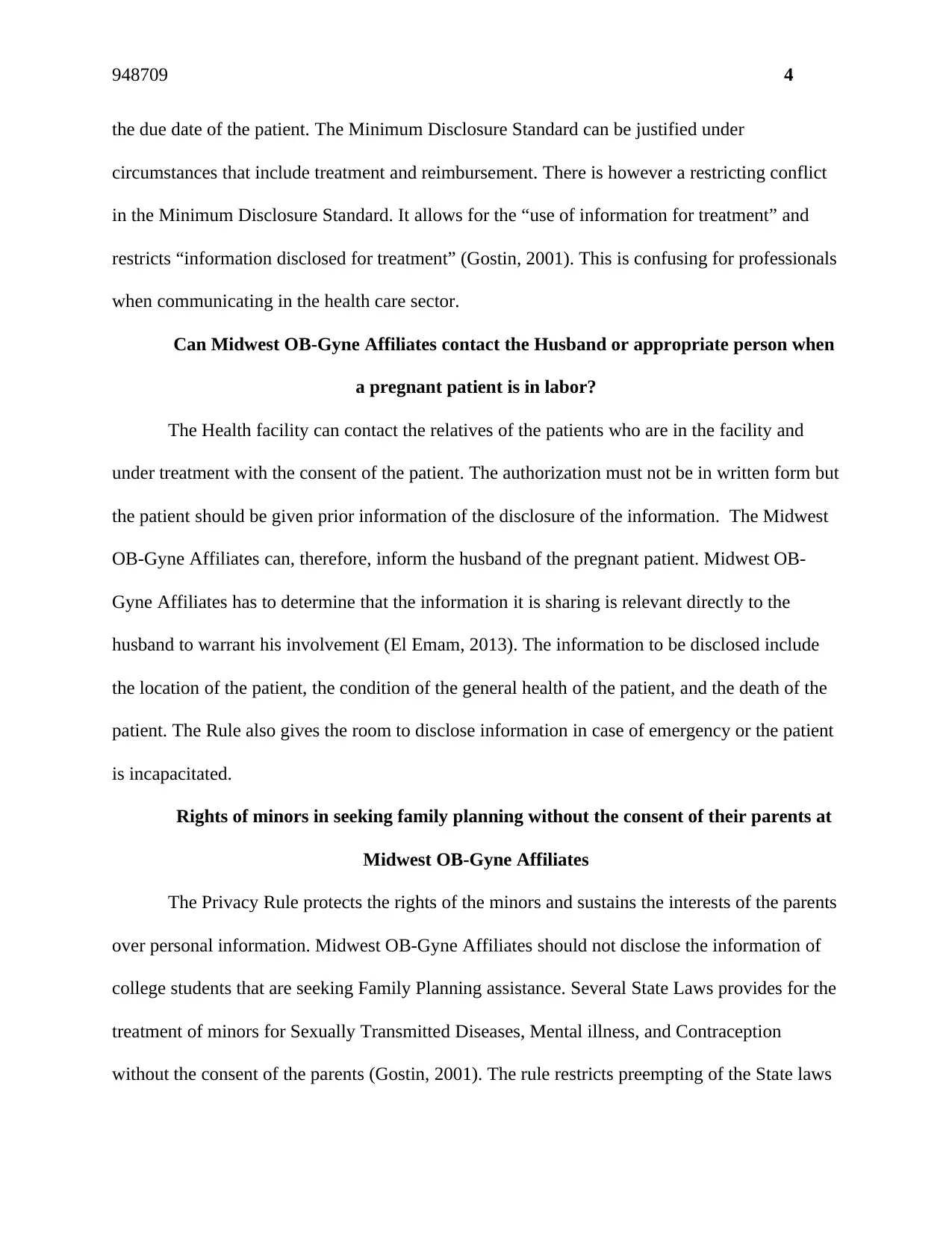
948709 4
the due date of the patient. The Minimum Disclosure Standard can be justified under
circumstances that include treatment and reimbursement. There is however a restricting conflict
in the Minimum Disclosure Standard. It allows for the “use of information for treatment” and
restricts “information disclosed for treatment” (Gostin, 2001). This is confusing for professionals
when communicating in the health care sector.
Can Midwest OB-Gyne Affiliates contact the Husband or appropriate person when
a pregnant patient is in labor?
The Health facility can contact the relatives of the patients who are in the facility and
under treatment with the consent of the patient. The authorization must not be in written form but
the patient should be given prior information of the disclosure of the information. The Midwest
OB-Gyne Affiliates can, therefore, inform the husband of the pregnant patient. Midwest OB-
Gyne Affiliates has to determine that the information it is sharing is relevant directly to the
husband to warrant his involvement (El Emam, 2013). The information to be disclosed include
the location of the patient, the condition of the general health of the patient, and the death of the
patient. The Rule also gives the room to disclose information in case of emergency or the patient
is incapacitated.
Rights of minors in seeking family planning without the consent of their parents at
Midwest OB-Gyne Affiliates
The Privacy Rule protects the rights of the minors and sustains the interests of the parents
over personal information. Midwest OB-Gyne Affiliates should not disclose the information of
college students that are seeking Family Planning assistance. Several State Laws provides for the
treatment of minors for Sexually Transmitted Diseases, Mental illness, and Contraception
without the consent of the parents (Gostin, 2001). The rule restricts preempting of the State laws
the due date of the patient. The Minimum Disclosure Standard can be justified under
circumstances that include treatment and reimbursement. There is however a restricting conflict
in the Minimum Disclosure Standard. It allows for the “use of information for treatment” and
restricts “information disclosed for treatment” (Gostin, 2001). This is confusing for professionals
when communicating in the health care sector.
Can Midwest OB-Gyne Affiliates contact the Husband or appropriate person when
a pregnant patient is in labor?
The Health facility can contact the relatives of the patients who are in the facility and
under treatment with the consent of the patient. The authorization must not be in written form but
the patient should be given prior information of the disclosure of the information. The Midwest
OB-Gyne Affiliates can, therefore, inform the husband of the pregnant patient. Midwest OB-
Gyne Affiliates has to determine that the information it is sharing is relevant directly to the
husband to warrant his involvement (El Emam, 2013). The information to be disclosed include
the location of the patient, the condition of the general health of the patient, and the death of the
patient. The Rule also gives the room to disclose information in case of emergency or the patient
is incapacitated.
Rights of minors in seeking family planning without the consent of their parents at
Midwest OB-Gyne Affiliates
The Privacy Rule protects the rights of the minors and sustains the interests of the parents
over personal information. Midwest OB-Gyne Affiliates should not disclose the information of
college students that are seeking Family Planning assistance. Several State Laws provides for the
treatment of minors for Sexually Transmitted Diseases, Mental illness, and Contraception
without the consent of the parents (Gostin, 2001). The rule restricts preempting of the State laws
Secure Best Marks with AI Grader
Need help grading? Try our AI Grader for instant feedback on your assignments.
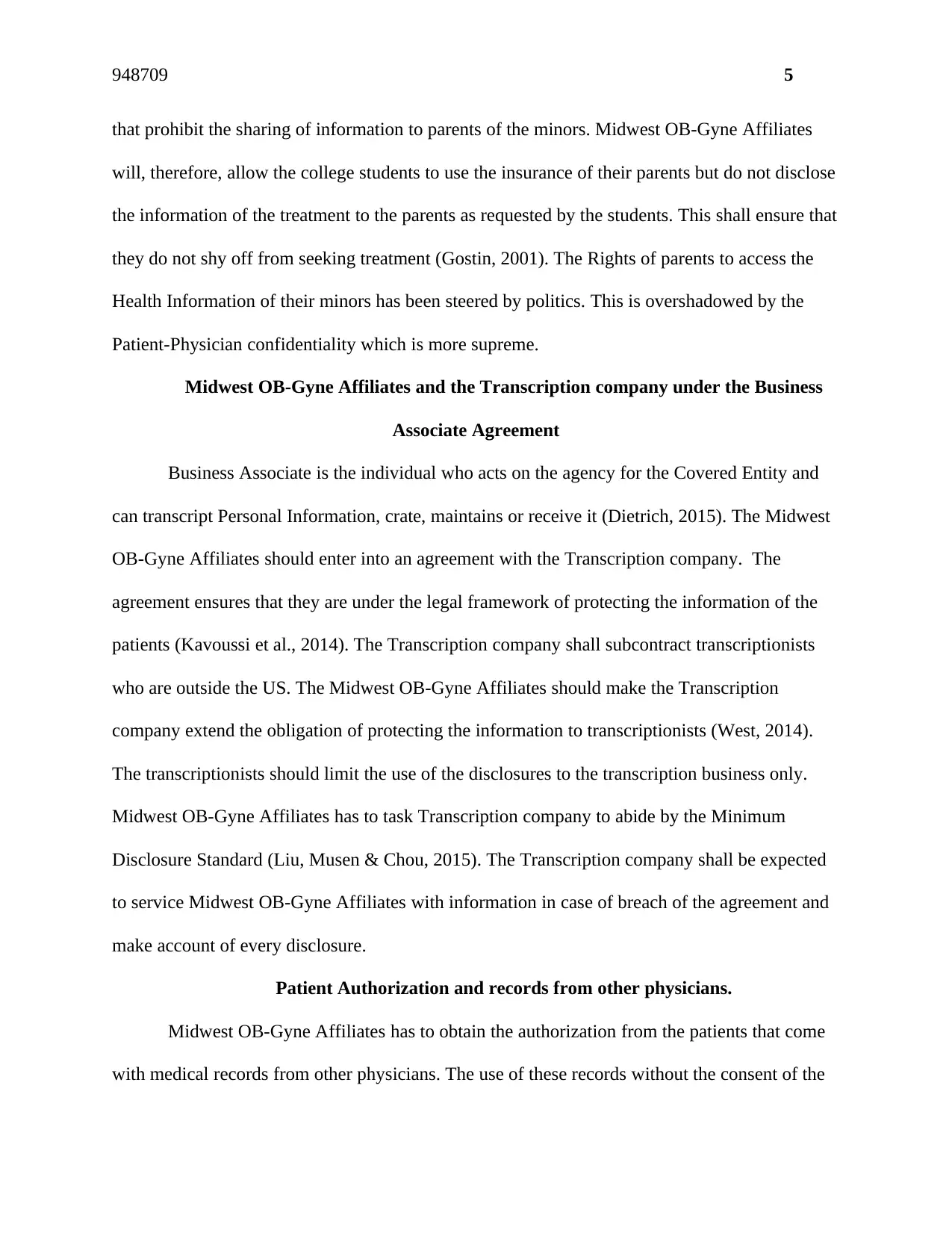
948709 5
that prohibit the sharing of information to parents of the minors. Midwest OB-Gyne Affiliates
will, therefore, allow the college students to use the insurance of their parents but do not disclose
the information of the treatment to the parents as requested by the students. This shall ensure that
they do not shy off from seeking treatment (Gostin, 2001). The Rights of parents to access the
Health Information of their minors has been steered by politics. This is overshadowed by the
Patient-Physician confidentiality which is more supreme.
Midwest OB-Gyne Affiliates and the Transcription company under the Business
Associate Agreement
Business Associate is the individual who acts on the agency for the Covered Entity and
can transcript Personal Information, crate, maintains or receive it (Dietrich, 2015). The Midwest
OB-Gyne Affiliates should enter into an agreement with the Transcription company. The
agreement ensures that they are under the legal framework of protecting the information of the
patients (Kavoussi et al., 2014). The Transcription company shall subcontract transcriptionists
who are outside the US. The Midwest OB-Gyne Affiliates should make the Transcription
company extend the obligation of protecting the information to transcriptionists (West, 2014).
The transcriptionists should limit the use of the disclosures to the transcription business only.
Midwest OB-Gyne Affiliates has to task Transcription company to abide by the Minimum
Disclosure Standard (Liu, Musen & Chou, 2015). The Transcription company shall be expected
to service Midwest OB-Gyne Affiliates with information in case of breach of the agreement and
make account of every disclosure.
Patient Authorization and records from other physicians.
Midwest OB-Gyne Affiliates has to obtain the authorization from the patients that come
with medical records from other physicians. The use of these records without the consent of the
that prohibit the sharing of information to parents of the minors. Midwest OB-Gyne Affiliates
will, therefore, allow the college students to use the insurance of their parents but do not disclose
the information of the treatment to the parents as requested by the students. This shall ensure that
they do not shy off from seeking treatment (Gostin, 2001). The Rights of parents to access the
Health Information of their minors has been steered by politics. This is overshadowed by the
Patient-Physician confidentiality which is more supreme.
Midwest OB-Gyne Affiliates and the Transcription company under the Business
Associate Agreement
Business Associate is the individual who acts on the agency for the Covered Entity and
can transcript Personal Information, crate, maintains or receive it (Dietrich, 2015). The Midwest
OB-Gyne Affiliates should enter into an agreement with the Transcription company. The
agreement ensures that they are under the legal framework of protecting the information of the
patients (Kavoussi et al., 2014). The Transcription company shall subcontract transcriptionists
who are outside the US. The Midwest OB-Gyne Affiliates should make the Transcription
company extend the obligation of protecting the information to transcriptionists (West, 2014).
The transcriptionists should limit the use of the disclosures to the transcription business only.
Midwest OB-Gyne Affiliates has to task Transcription company to abide by the Minimum
Disclosure Standard (Liu, Musen & Chou, 2015). The Transcription company shall be expected
to service Midwest OB-Gyne Affiliates with information in case of breach of the agreement and
make account of every disclosure.
Patient Authorization and records from other physicians.
Midwest OB-Gyne Affiliates has to obtain the authorization from the patients that come
with medical records from other physicians. The use of these records without the consent of the
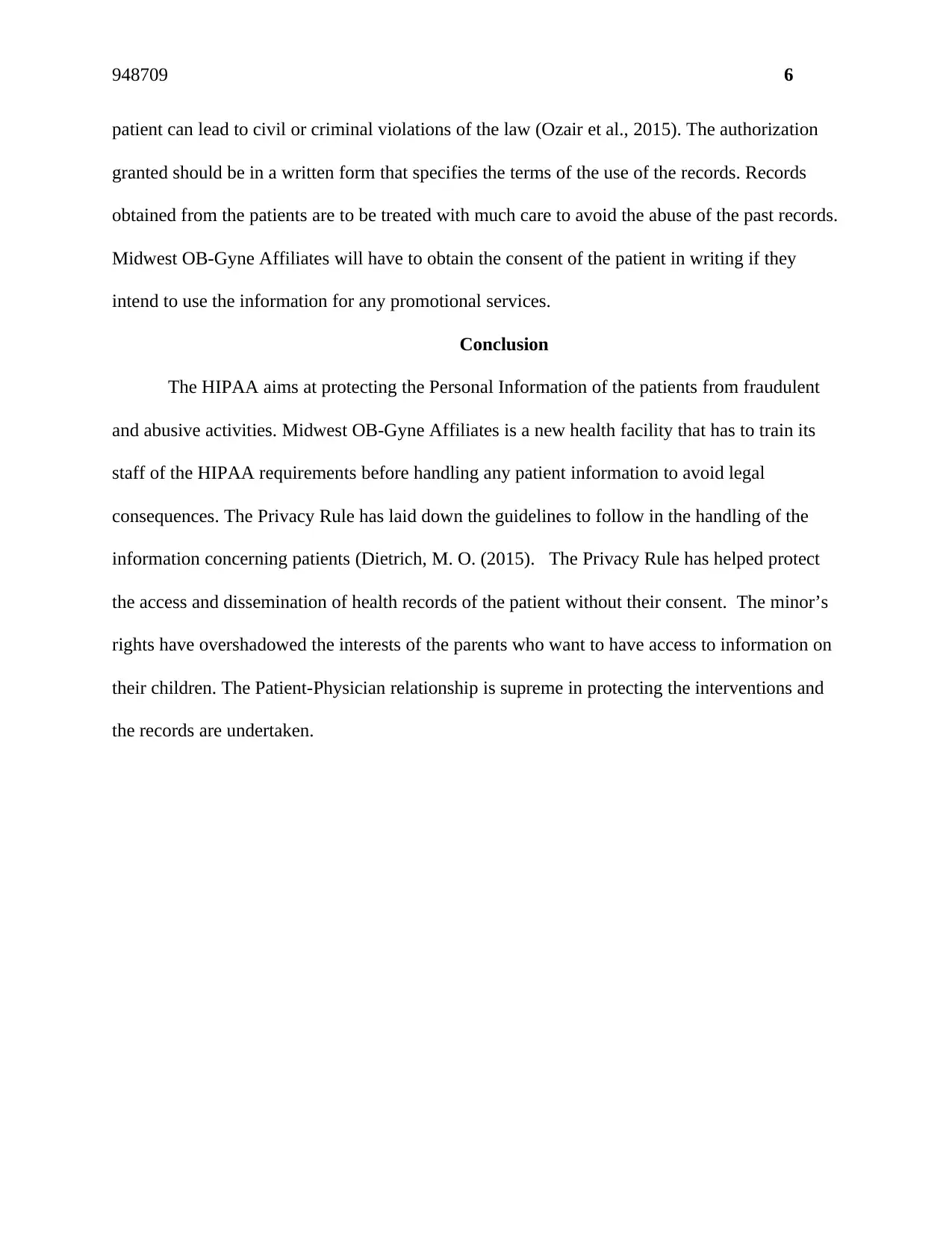
948709 6
patient can lead to civil or criminal violations of the law (Ozair et al., 2015). The authorization
granted should be in a written form that specifies the terms of the use of the records. Records
obtained from the patients are to be treated with much care to avoid the abuse of the past records.
Midwest OB-Gyne Affiliates will have to obtain the consent of the patient in writing if they
intend to use the information for any promotional services.
Conclusion
The HIPAA aims at protecting the Personal Information of the patients from fraudulent
and abusive activities. Midwest OB-Gyne Affiliates is a new health facility that has to train its
staff of the HIPAA requirements before handling any patient information to avoid legal
consequences. The Privacy Rule has laid down the guidelines to follow in the handling of the
information concerning patients (Dietrich, M. O. (2015). The Privacy Rule has helped protect
the access and dissemination of health records of the patient without their consent. The minor’s
rights have overshadowed the interests of the parents who want to have access to information on
their children. The Patient-Physician relationship is supreme in protecting the interventions and
the records are undertaken.
patient can lead to civil or criminal violations of the law (Ozair et al., 2015). The authorization
granted should be in a written form that specifies the terms of the use of the records. Records
obtained from the patients are to be treated with much care to avoid the abuse of the past records.
Midwest OB-Gyne Affiliates will have to obtain the consent of the patient in writing if they
intend to use the information for any promotional services.
Conclusion
The HIPAA aims at protecting the Personal Information of the patients from fraudulent
and abusive activities. Midwest OB-Gyne Affiliates is a new health facility that has to train its
staff of the HIPAA requirements before handling any patient information to avoid legal
consequences. The Privacy Rule has laid down the guidelines to follow in the handling of the
information concerning patients (Dietrich, M. O. (2015). The Privacy Rule has helped protect
the access and dissemination of health records of the patient without their consent. The minor’s
rights have overshadowed the interests of the parents who want to have access to information on
their children. The Patient-Physician relationship is supreme in protecting the interventions and
the records are undertaken.
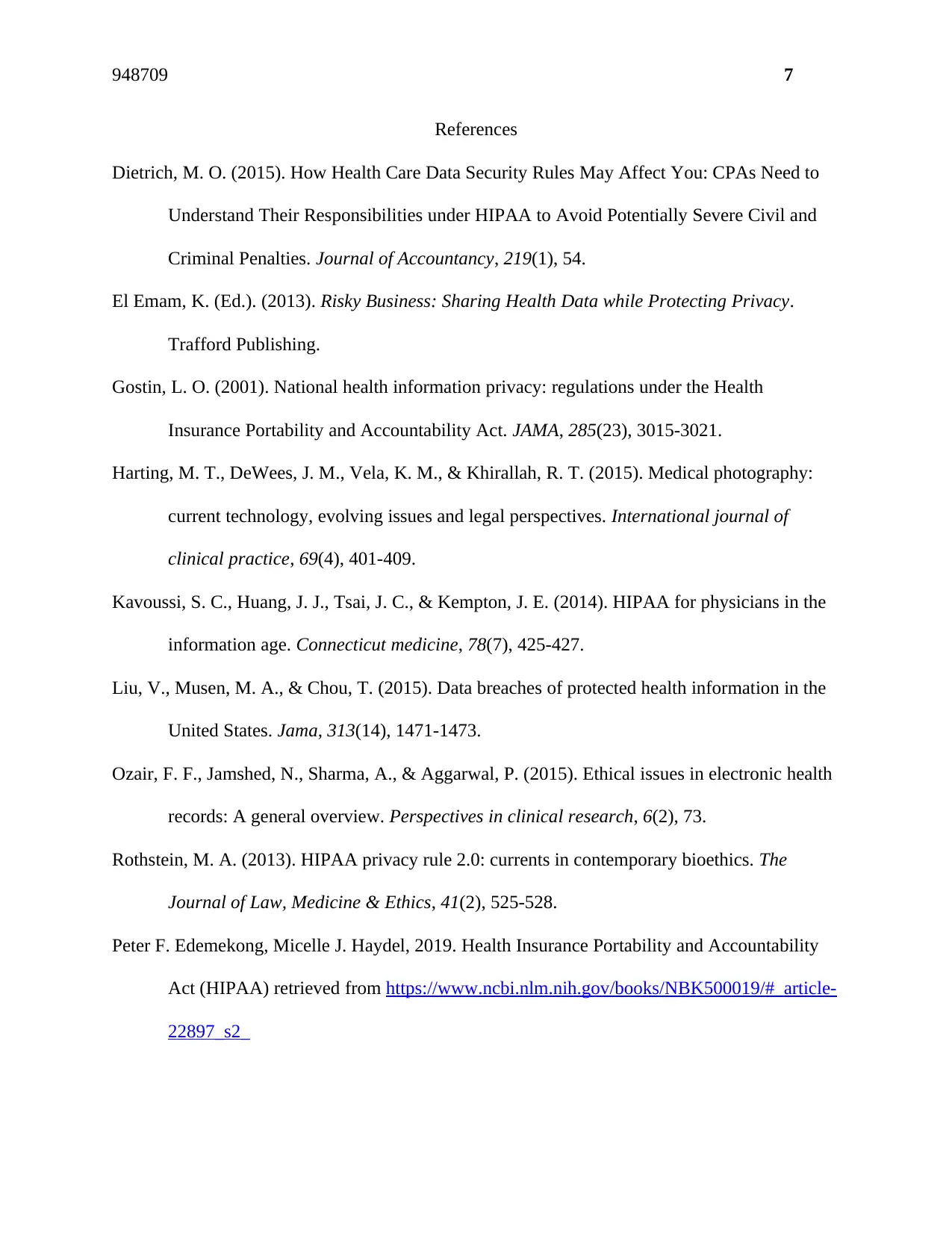
948709 7
References
Dietrich, M. O. (2015). How Health Care Data Security Rules May Affect You: CPAs Need to
Understand Their Responsibilities under HIPAA to Avoid Potentially Severe Civil and
Criminal Penalties. Journal of Accountancy, 219(1), 54.
El Emam, K. (Ed.). (2013). Risky Business: Sharing Health Data while Protecting Privacy.
Trafford Publishing.
Gostin, L. O. (2001). National health information privacy: regulations under the Health
Insurance Portability and Accountability Act. JAMA, 285(23), 3015-3021.
Harting, M. T., DeWees, J. M., Vela, K. M., & Khirallah, R. T. (2015). Medical photography:
current technology, evolving issues and legal perspectives. International journal of
clinical practice, 69(4), 401-409.
Kavoussi, S. C., Huang, J. J., Tsai, J. C., & Kempton, J. E. (2014). HIPAA for physicians in the
information age. Connecticut medicine, 78(7), 425-427.
Liu, V., Musen, M. A., & Chou, T. (2015). Data breaches of protected health information in the
United States. Jama, 313(14), 1471-1473.
Ozair, F. F., Jamshed, N., Sharma, A., & Aggarwal, P. (2015). Ethical issues in electronic health
records: A general overview. Perspectives in clinical research, 6(2), 73.
Rothstein, M. A. (2013). HIPAA privacy rule 2.0: currents in contemporary bioethics. The
Journal of Law, Medicine & Ethics, 41(2), 525-528.
Peter F. Edemekong, Micelle J. Haydel, 2019. Health Insurance Portability and Accountability
Act (HIPAA) retrieved from https://www.ncbi.nlm.nih.gov/books/NBK500019/#_article-
22897_s2_
References
Dietrich, M. O. (2015). How Health Care Data Security Rules May Affect You: CPAs Need to
Understand Their Responsibilities under HIPAA to Avoid Potentially Severe Civil and
Criminal Penalties. Journal of Accountancy, 219(1), 54.
El Emam, K. (Ed.). (2013). Risky Business: Sharing Health Data while Protecting Privacy.
Trafford Publishing.
Gostin, L. O. (2001). National health information privacy: regulations under the Health
Insurance Portability and Accountability Act. JAMA, 285(23), 3015-3021.
Harting, M. T., DeWees, J. M., Vela, K. M., & Khirallah, R. T. (2015). Medical photography:
current technology, evolving issues and legal perspectives. International journal of
clinical practice, 69(4), 401-409.
Kavoussi, S. C., Huang, J. J., Tsai, J. C., & Kempton, J. E. (2014). HIPAA for physicians in the
information age. Connecticut medicine, 78(7), 425-427.
Liu, V., Musen, M. A., & Chou, T. (2015). Data breaches of protected health information in the
United States. Jama, 313(14), 1471-1473.
Ozair, F. F., Jamshed, N., Sharma, A., & Aggarwal, P. (2015). Ethical issues in electronic health
records: A general overview. Perspectives in clinical research, 6(2), 73.
Rothstein, M. A. (2013). HIPAA privacy rule 2.0: currents in contemporary bioethics. The
Journal of Law, Medicine & Ethics, 41(2), 525-528.
Peter F. Edemekong, Micelle J. Haydel, 2019. Health Insurance Portability and Accountability
Act (HIPAA) retrieved from https://www.ncbi.nlm.nih.gov/books/NBK500019/#_article-
22897_s2_
Paraphrase This Document
Need a fresh take? Get an instant paraphrase of this document with our AI Paraphraser

948709 8
West, S. L., Johnson, W., Visscher, W., Kluckman, M., Qin, Y., & Larsen, A. (2014). The
challenges of linking health insurer claims with electronic medical records. Health
informatics journal, 20(1), 22-34.
West, S. L., Johnson, W., Visscher, W., Kluckman, M., Qin, Y., & Larsen, A. (2014). The
challenges of linking health insurer claims with electronic medical records. Health
informatics journal, 20(1), 22-34.
1 out of 8
Related Documents
Your All-in-One AI-Powered Toolkit for Academic Success.
+13062052269
info@desklib.com
Available 24*7 on WhatsApp / Email
![[object Object]](/_next/static/media/star-bottom.7253800d.svg)
Unlock your academic potential
© 2024 | Zucol Services PVT LTD | All rights reserved.





